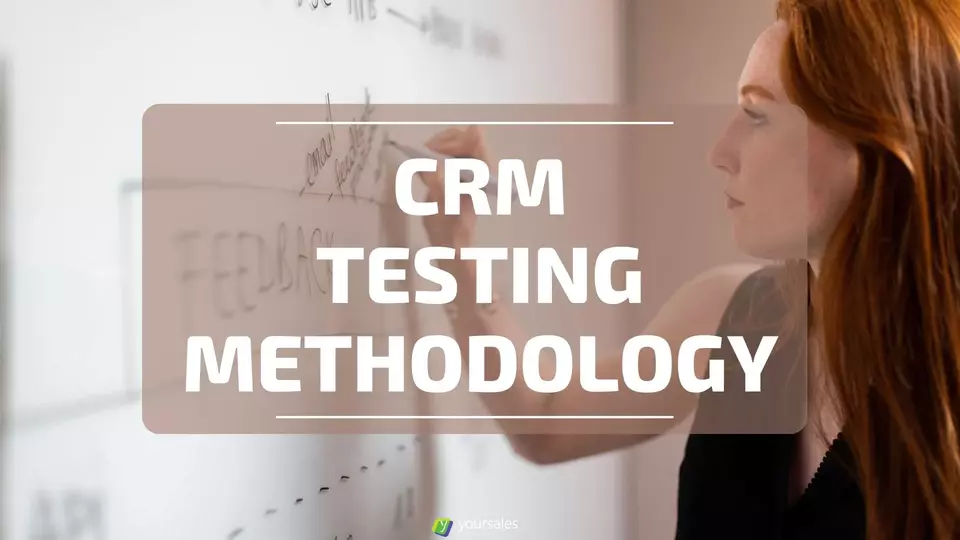CRM Testing Methodology v2
Following the sales leader CRM survey and the “Top 5 Problems Sales Leaders Want CRM to Solve” article it enabled, we’re turning our focus to the creation of a CRM testing methodology. This allows us to continuously test CRMs against the same criteria and allow for relatively objective evaluation.
In order to put CRMs to the test as objectively as possible, our CRM testing method will benchmark their performance against each of the top 5 problems from the Top 5 Problems Sales Leaders Want CRM to Solve:
- Storing and organizing customer data, voted on by 59,9% of responders.
- Forecasting sales, voted on by 57,3% of responders.
- Capturing client/prospect communication, voted on by 52,9% of responders.
- Building and growing existing accounts, voted on by 51,6% of responders.
- Provide Data & Insights to enable leaders and teams to know where they need to work, voted on by 50,3% of responders.
- Cost-drivers: Price required to sufficiently solve the 5 elements listed above.
In this article we lay out our CRM testing system and explain how we test against each of the 6 factors listed above.

Storing and organizing customer data
According to sales leaders this is the most critical problem CRMs must solve. In our CRM testing methodology we’ll be looking at :
Data Types
- structured data: data which is always formatted in the same way. Think addresses, emails, phone numbers, etc.
- unstructured data. Whereas structured data can be clearly defined, unstructured data a little less so. Think customer emails, chat and messenger logs, and social media interactions.
We’ll be looking at which kinds of structured and unstructured data are supported and how easy they are to use.
Data Sources
Where does data flow to CRM from? Sales people provide part of the input, yes! On the other hand marketing automation, leads list software, external email automation, dialers, accounting software, product use software, and much more.

Forecasting sales
The second most important function of a CRM system according to sales leaders, is to enable proper sales forecasting. Any serious CRM testing methodology would have to include a review of forecasting options.
This is a very broad topic. It involves the ability to analyse factually every bit of customer- and deal-related data in the organisation with the aim to predict the future of everything that matters for sales at the company.
We’ll be looking at in how far the following forecasting methods are possible with each CRM offering:
- Sales Funnel Analysis
- Historical Analysis
- Market Research and Competitive Analysis
- Customer Segmentation and Predictive Analytics

Capturing client/prospect communication
Capturing client or prospect communication refers to the systematic process of recording, analyzing, and storing all interactions, conversations, and engagements between sales teams and their clients or prospects.
This means that we’ll be looking at the methods CRMs use to pick up on any and all communication with clients and prospects using communication channels such as, but not limited to, emails, phone calls, meetings, instant messaging, and social media interactions.
Building and growing existing accounts
It’s a lot easier and cheaper to sell more to existing accounts than to capture new accounts. Driving revenue and profits up with existing accounts is the lowest hanging fruit.
Nurturing existing customers makes it possible to understand them, identify needs, and expands the relationship doing more business.
As explained in the article about building and growing existing accounts, CRMs play a critical role in various ways. Our CRM testing methodology will review in how far CRMs deliver.

Centralizing Customer Data
To gain true insight into a customer organisation, a single source of truth is required. Centralizing all data about a customer increases insight and understanding.
Fully transparent data on all aspects of the customer relationship enables all members of the organization to help the customer and deliver value in all possible ways.
Enhancing Communication and Collaboration
Nurture is all about consistently communicating value and internal teams collaborating at all steps of the experience customer journey (if you’d like a quick explainer for the experience customer journey, look in this article).
In the experience customer journey, after the customer relationship has formed and initial sale has been done, the following process should occur:
Post Sales (Customer Success)
5. I’m in good hands! They clearly know what I want and need—Handoff
6. Boom! They did what they said they would do—Onboarding
7. Yeah! This is working—Utilization
8. Awesome! I’ve got to share with others—Expansion
9. ROI! I have tangible results and I’m excited to work with you again—Renewal
When this all goes well, customers are very likely to want more dialogue. This vastly increases chances of expanding the account.
With good internal collaboration tools available as part of the CRM, creating a healthy post-sales experience for the customer becomes much easier.

Tracking Sales and Customer Interactions
This will be touched on, of course, in other parts of the CRM testing methodology. Here we’re looking specifically at ways to track sales and improve customer interactions in order to expand accounts.
Automation and Workflow Streamlining
A proper nurture process requires consistently getting back to the customer and lead with value. To make the consistency work, CRMs play a role by enabling automation and workflow streamlining.
That frees up sales time to spend more time being customer-facing.
Also follow-up reminders or automatic triggers based on certain customer actions help engage in nurturing conversations at exactly the right time.
Data-Driven Insights and Reporting
Eventually, a significant amount of data on each account will be gathered. This enables detailed analysis of signals of customer happiness and readiness to expand. It also enables warning signals sales can use to avert catastrophic customer departure.
The insights can show what’s working and what’s not in terms of building and expanding existing accounts, so sales can spend time doing just the parts that work.

Provide Data & Insights
Beyond just growing existing accounts, data & insights are an absolutely component of any valuable CRM.
As part of our CRM testing methodology we’ll explore in how far CRMs deliver insights that make it easier to win, keep, and expand accounts.
Team management is important as well, of course, so understanding who’s winning and who’s losing partly comes from understanding CRM data.
Pinpointing areas ripe for coaching can comes from better understanding insights from the CRM.
Generally speaking, better planning is made possible by having healthy data in a CRM.

What Can’t Our CRM Testing Methodology Test?
While our CRM testing methodology will review a significant range of criteria, there’s also a range of criteria it can’t possibly know. If you need us to help review a CRM for you, set a time to talk here. Here’s a quick run-down of elements that need careful inspection:
Can You Sell It?
Any new CRM-system will require a sales effort to become a success in any organisation. You WILL hear complaints about what it can’t which the previous system could or the system you didn’t buy can.
The value of any CRM system requires very wide user adoption. To get that, you will need to sell the brand new CRM system. Forever!
If you won’t or can’t do that, it’s likely to take a lot longer for your CRM investment to reach ROI. If ever.
Bottom line is: Without knowing you, we can’t test for you if you can really do this.
Are You Different?
Outside the factors above, there’s a good deal of variables that relate directly to business models as well. Maybe you need a CRM, which caters specifically to a recurring revenue business model – or specifically not.
Possibly you have regulatory requirements, which a CRM MUST solve for you.
Maybe your business requires you to solve slightly different problems than the general top 5 stated above. You may prioritise these challenges slightly different, leading to a different outcome of a CRM selection process.
Again, without knowing you, we can’t test for this. No way a non-interactive CRM testing methodology can test for this.
Is Your Tech Stack Different?
Maybe you have complex requirements for Configure-Price-Quote (CPQ) elements of your offering. This might require extra features or – more likely – integration with a CPQ-tool.
Maybe you have a hard technical requirement for integration with a particular part of your tech stack.
Or maybe you need to review certain technical elements in order to stay compliant with standards or legislation.
Scoring
To make sense of things we’ll be deploying a scoring system. A score will be applied to each category the CRMs are tested against. The scoring will look as follows:
| Grade | Meaning |
|---|---|
| 10 | Outstanding |
| 9 | Very good |
| 8 | Good |
| 7 | More than satisfactory |
| 6 | Satisfactory |
| 5 | Almost satisfactory |
| 4 | Unsatisfactory |
| 3 | Very unsatisfactory |
| 2 | Poor |
| 1 | Very Poor |
Need Help Picking a CRM?
Let us help you out. Go here and set a time to talk.
Either way, good luck with your CRM – and happy selling.


Comments 2
Thank you for this insightful article… This is usually not freely available…
As we are looking for CRM tools ourselves this article is really helpful. Thank you!
We were planning to do a procurement process with a request for information and a request for a quotation, for a replacement of our existing CRM tool, because we have some specific challenges and an IT landscape we want the CRM solution to integrate with.
These are naturally not covered in your article, and we see that by consulting yoursales we are likely to save time, and money and the worst case also change fatigue if we would choose the “wrong” solution.
Do you offer Tool Selection services, now that you are so knowledgeable in this field?
Author
Thanks, Lars. Hope you can put it to good use. Let us know if you have questions about how to apply it!